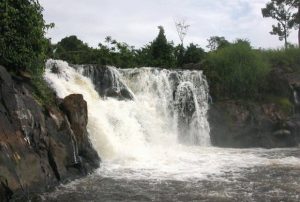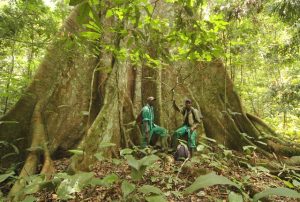Best places to visit in Cameroon.
1. Chutes de la Lobe Waterfalls

Popularly known as the ‘waterfall by the sea’, is one of the largest waterfalls in the equatorial region and among the favorite tourist attractions. This location is of immense scenic beauty and also facilitates boat rides arranged by private companies across the river, highly recommended for tourists traveling to this spot.
2. Limbe Wildlife Centre/Botanical centre

Limbe, formerly known as Victoria is a port city, reminding the people of its British and German colonial past, and in turn responsible for the diverse flora and fauna of this region, extending from exotic crops to plantations of coffee, rubber and cocoa, which puts the Botanical Centre on the recommended sightseeing list.
3. Down Beach/ Bimbia Rain-Forest

This attraction of the Limbe city serves as the culinary center. The place is a must visit for all the connoisseurs of sea-food, food tourism being prevalent in this area. The Bimbia Rain-forest in the adjacent area is recommended for its mangrove trails.
4. Mount Cameroon

The highest active volcano peak (13,435 ft.) in West Africa, situated on the south-western part of Cameroon, Mt.Cameroon is one of the favourite trekking trails of adventure tourism. A four day long trek from the base at colonial town of Buea, which also has the history of being the first post office in West Africa.
5. Korup National Park

In the South-west district close to the Nigerian border, this National park is a primary forest with the oldest and richest flora and fauna. The National park 1,260 sq. Kms. wide provides diverse trails for trekking, bird watching and animal study with infrastructure for habitation
6. Ekom Nkam Waterfalls

The mountainous terrain amidst the rainforest, cause many waterfalls but the Chutes d’Ekom is particularly recommended for its picturesque view. The literal name of waterfall is ‘falling from Ekom’, the local village is close to the city of Melong.
7. Dja Faunal Reserve

This wildlife reserve is on the banks of the river Dja, protected by UNESCO World Heritage Site. However, this place is not fully equipped for tourism, the objective being to protect the natural habitat of wildlife.
8. Yaounde

This is the capital city which holds historic and political references. In addition to the Mefou National Park, the National Museum of Yaounde reflects upon the history and culture of the country. Another private endeavor by the name of Blackitude Museum is an ethnographic museum for protection and preservation of artistic heritage.
9. Douala

This sea-port city has vital geographic and commercial interest, housing Museum of Maritime, Doul’Art and Cathedrale Saint Pierre et Saint Paul as centres of local culture. This city is important to transit across Cameroon and houses only certain cultural centres.
